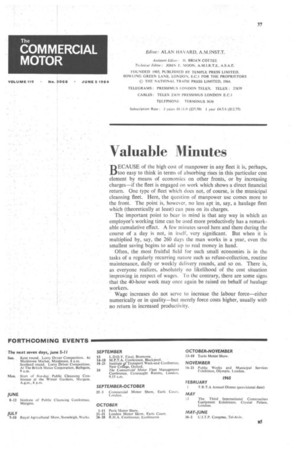Valuable Minutes
Page 39

If you've noticed an error in this article please click here to report it so we can fix it.
D ECAUSE of the high cost of manpower in any fleet it is, perhaps, ptoo easy to think in terms of absorbing rises in.this particular cost element by means of economies on other fronts,' or by increasing charges—if the fleet is engaged on work which shows a direct financial return. One type of fleet which does not, of course, is the municipal cleansing fleet. Here, the question of manpower use comes more to the front. The point is, however, no less apt in, say, a haulage fleet which (theoretically at least) can pass on its charges.
The important point to bear in mind is that any way in which an employee's working time can be used more productively has a remarkable cumulative effect. A few minutes saved here and there during the course of a day is not, in itself, very significant. But when it is multiplied by, say, the 260 days the man works in a year, even the smallest saving begins to add up to real money in hand.
Often, the Most fruitful field for such small economies is in the tasks of a regularly recurring nature such as refuse-collection, routine maintenance, daily or weekly delivery rounds, and so on. There is, as everyone realizes, absolutely no likelihood of the cost situation improving in respect of wages. To the contrary, there are some signs that the 40-hour week may once again be raised on behalf of haulage workers.
Wage increases do not serve to increase the labour force—either numerically or in quality—but merely force costs higher, usually with no return in increased productivity.












































































































































































